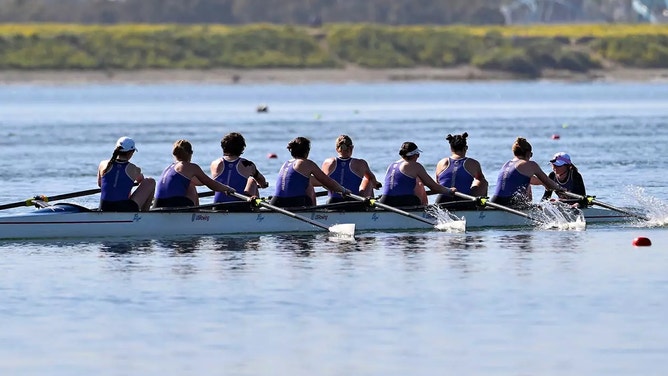Division I Transgender Rower Chooses To Compete In Women's Category Despite Identifying As Male
Cillian Mullen is a junior rower at the University of Washington.
Mullen is a biological female, but identifies as a transgender man. Mullen’s Instagram profile reflects this, proudly announcing "he/him" pronouns. USRowing, the national governing body for the sport, has posted about Mullen, using those very same pronouns.
Those posts note that "he" (Mullen) is racing in women’s events.
Women’s events.
To be clear: there is nothing wrong with Mullen competing on the women's team from a competitive fairness standpoint. Mullen is a female. However, it does raise questions about why Mullen would WANT to compete on the women's team.
It's hard to understand why it's so easy for some people to write things like "HE had a great performance during HIS heat in the WOMEN'S race" without any sense of irony.
So often, radical left-wing gender ideologists preach about how people should be allowed to compete with and against their gender identity, rather than their biological sex. This is why they believe males who call themselves girls and women should be allowed to compete in women's sports.
And society should accept that, they argue, because it's important for these people to play on the team that reflects their gender identity so that they feel most comfortable.
OK, fine. That's absurd and completely destroys the idea of fairness in women's sports, but let's go along with that logic for a moment. If Mullen truly believes that Mullen is a boy, and wants everyone else to refer to the athlete as a boy, then why wouldn't the athlete compete on the boys' team?
The answer is obvious, and an article from the Northwestern University website in 2022 confirms that.
"Mullen came out in 2020, but he explained he continues to compete on women’s teams without pursuing a medical transition because doing so would interrupt his ability to row at the elite level to which he has become accustomed. While he says he does hope to medically transition one day, he currently expresses his masculinity in other ways," the article reads.
Ah, OK. So Mullen wants to be an elite athlete and realizes that the only way that's possible is to compete against women.

University of Washington women's rowing team member Cillian Mullen identifies as a transgender man but competes as a woman, so the athlete can remain elite.
(University of Washington Athletics)
Jen Sey, the founder of XX-XY Athletics, noted that Mullen is admitting the obvious by competing with and against women.
"It is revealing that Mullen admits that competing in the men's category would interrupt 'his' ability to row at the elite level. That is correct. ‘He’ is a woman, and he wouldn’t make it in men’s rowing," Sey told OutKick.
"Mullen knows this, but somehow all the trans-identified males insist they don’t carry male advantage into the women’s category. It’s such a lie. They just want to win, and they are willing to cheat to do it."
This is exactly why OutKick pushes back against males competing in women's sports. It's much easier for an athlete to dominate women's sports than men's sports. Mullen knows that, too. So, despite wanting the entire world to recognize Mullen as a boy, the athlete chooses to compete in the women's category.
But isn't it important for Mullen to feel accepted as a man? Apparently, at all times except during competitions. Then, Mullen is a woman. That seems quite hypocritical.
OutKick reached out to the University of Washington in an attempt to contact Mullen for this story. We have not yet heard back.
Mullen has advocated for males to compete in women's sports if they identify as transgender. After all, Mullen lists Angel Joy Flores – a biological male who sought to compete in women's power-lifting – as a hero, even shouting out Flores on Mullen's USRowing.org bio: "Cillian lists one of his personal [heroes as] Angel Joy Flores, because she is a fellow trans athlete who keeps a positive but realistic attitude about playing sports as a trans athlete and is someone Cillian strives to be like for generations of trans athletes to come."
So, to sum up Mullen's position: a person born female should compete in women's sports. A person born male but who thinks they are a woman should compete in women's sports. And, finally, a person who is born female but thinks they are a man should compete in women's sports.
Essentially, anyone who wants to compete in women's sports should be allowed. This is exactly what pro-women advocates like Riley Gaines are fighting against.
"The women’s category has become a catch-all in the name of ‘inclusion.’ It now includes women who identify as women, women who identify as men, men who identify as women, and—at this rate—perhaps even men who identify as men," Gaines, host of the OutKick podcast Gaines for Girls, said.
"If ‘men in women’s sports’ had a true inverse, we’d see women competing in men’s sports at the elite level. But we don’t. Even the most dedicated proponents of the gender cult don’t actually believe their own ideology. If ‘trans men are men’ meant anything, Cillian Mullen would be competing with men—but she’s not.
"And despite what Justice Ketanji Brown Jackson might suggest, you don’t need a biologist to figure out why," Gaines added.

University of Washington women's rowing team member Cillian Mullen identifies as a transgender man but competes as a woman, so the athlete can remain elite.
(University of Washington Athletics)
Mullen is not unlike Nikki Hiltz, a 'non-binary transgender' track athlete who qualified for the women's U.S. Olympic team.
"Hi I’m Nikki and I’m transgender. That means I don’t identify with the gender I was assigned at birth… The best way I can explain my gender is as fluid. Sometimes I wake up feeling like a powerful queen and other days I wake up feeling as if I’m just a guy being a dude, and other times I identify outside of the gender binary entirely," Hiltz once said.
Like Hiltz, Mullen doesn't "identify with the gender" they were "assigned at birth." Except, of course, on race day.
Then, both of them very much identify as women so they can win competitions.